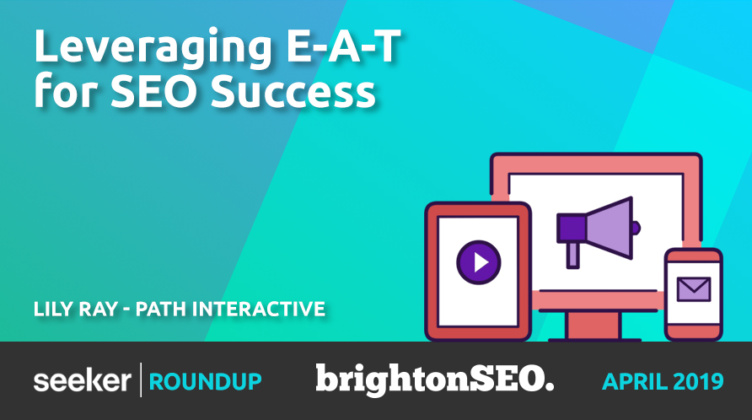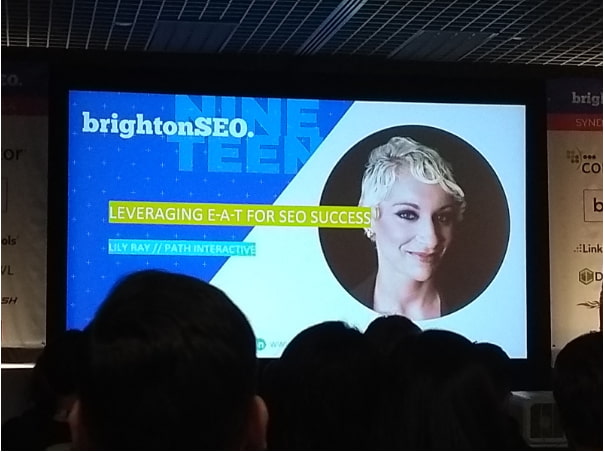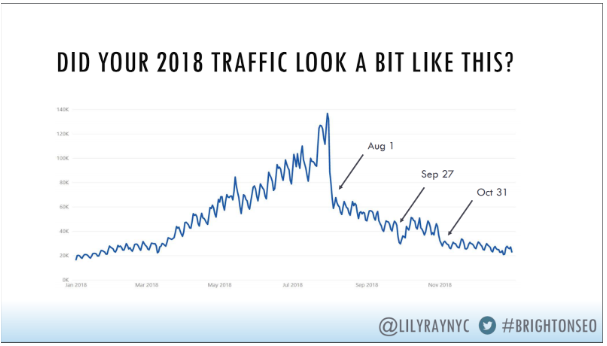
This talk offered some mouth-watering insight into three words that have lit up the world of SEO: Expertise, Authority, and Trust. Lily Ray’s talk explained how EAT is shaping how we do search after the August 2018 Google update.
Overview
- Speaker’s name: Lily Ray
- Job role and company: SEO Director at Path Interactive
- Links to Twitter profile: @lilyraynyc
- Link to LinkedIn profile: https://www.linkedin.com/in/lily-ray-44755615/
- Link to the slides: https://www.pathinteractive.com/wp-content/uploads/docs/Lily_Ray

What was the talk about?
All the way from America, Lily Ray came to BrightonSEO to talk about E-A-T.
Standing for expertise, authority, and trustworthiness, it’s an acronym that is referred to a lot in Google’s Quality Raters’ Guidelines.
The other acronym mentioned in Lily’s talk was YMYL. Standing for your money or your life, these pages usually refer to your physical or financial well being.
After the Google E-A-T Algorithm updated in August 2018, a lot of websites that didn’t meet the required standard for quality experienced a huge drop in traffic.

As the SEO Director at Path Interactive, Lily analysed over 100 websites to determine the wide-ranging and specific effects of the latest E-A-T update. She broke down her findings into the following categories.
- Deceptive content
- Expertise
- Authorship
- Advertisements
- External reviews
- Trust issues
- About us page
- User-generated content
Using two comparable websites in similar niches, Lily showed how different websites were affected by E-A-T in the areas listed above.
Taking Authorship as an example, Lily cited the example of Dr. Steven Lin, who promotes himself as the world’s foremost functional dentist. Because his website included references to being a best-selling author, and his content features extensive citations, and high-quality comments his site enjoyed a massive boost in traffic after last year’s E-A-T update.
Conversely, taking advertisements as an example, Lily pointed to Trusted Reviews. Once a reliable source for unbiased evaluations of products, the site has gradually become plagued with too many ads. As a result, has suffered a massive decline in traffic since last year.
Potential impact on the industry
In a desire to give its users the best possible results, Google is consistently fighting misinformation. This is why E-A-T is so important. The search giant relies on businesses, content creators, and marketers to make the internet a font of high-quality information.
If you wouldn’t trust a website, the likelihood is that Google’s algorithm won’t either. For this reason, focusing on E-A-T and improving your content can help boost your SEO massively.
This is one of the most detailed talks I've ever seen touching on the exact impact of EAT and what can websites actually do to recover from it – this is awesome Lily! It was also great to meet you in person! 💪
— Areej AbuAli (@areej_abuali) April 13, 2019
Key takeaways
We only touched upon the tactics that Lily described can improve the E-A-T of your content above. You can check out the slides for more details, but we’ve included the five main takeaways below:
- Improve your online reputation with reviews on third-party sites
- Don’t overwhelm your users with ads
- Clarify the authors of your content, and why they should be trusted
- Cite credible sources and link to authoritative sites
- Make sure YMYL is backed up by scientific evidence
